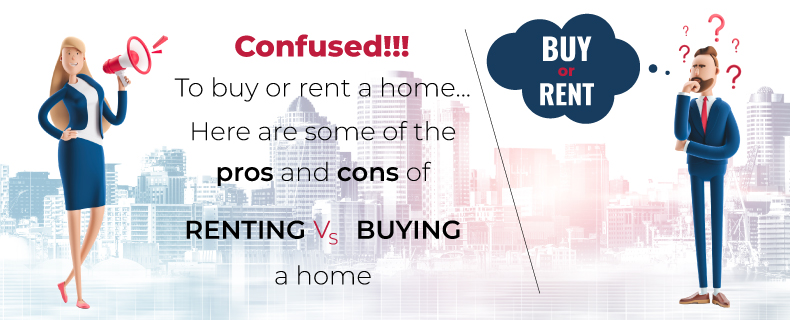
THE PROS AND CONS OF RENTING Vs. BUYING A HOME
Both buying a home and renting one have benefits and drawbacks.
The choice between renting and buying is influenced by a number of variables, including short and
long terms objectives, financial situation, and personal preferences. Here are some Pros and Cons of
each choice:
BUYING:

- PROS:
- Building Equity: When you buy a home, your mortgage payments contribute to building equity. Over time, you can potentially benefit from property value appreciation and build wealth.
- Stability and Control: Homeownership provide stability, as you have more control over your living situation. You can make changes to the property, personalize it, and enjoy long-term stability without concerns about rent increases or lease terminations.
- Potential Tax Benefits: Tax benefits of home ownership include mortgage interest and property tax deductions. These advantages may assist in lowering your overall tax obligation.
- CONS:
- Higher Upfront and Ongoing Costs: Buying a home typically requires a substantial upfront investment, including a down payment, closing costs, and ongoing expenses like property taxes, insurance, maintenance, and repairs.
- Less flexibility: Owning a home can limit your flexibility, as it may be more challenging to move quickly or frequently. Selling a home can take time, and market conditions can impact the resale value.
- Financial Risk: Property values can fluctuate, and if the market experiences a downturn, you may not see the anticipated return on investment. Additionally, homeownership carries the risk of unexpected expenses, such as major repairs or renovations.
RENTING:

- PROS:
- Flexibility: Renting provides more flexibility in terms of mobility. It allows you to easily move to a new location or explore different neighbourhoods without the commitment of owning a home.
- Lower Upfront Costs: Renting typically requires lower upfront costs compared to buying. You may need to pay a security deposit and possibly the first and last month's rent, but you avoid the large down payment and closing costs associated with buying a home.
- Limited Responsibility for Maintenance: As a renter, you are generally not responsible for major repairs and maintenance costs. Landlords are usually responsible for taking care of these issues.
- CONS:
- No Equity Building: Rent payments do not contribute to building equity or ownership in a property. You don't benefit from potential property value appreciation over time.
- Lack of Control and Stability: Renting means you are subject to the rules and decisions of the landlord. You may face rent increases, restrictions on customization, and the possibility of having to move if the landlord decides to sell or terminate the lease.
- Limited Personalization: Renting often comes with restrictions on making changes to the property. You may have limited freedom to customize or renovate the space to suit your preferences.
Ultimately, the decision between renting and buying depends on your individual circumstances, financial situation, and long-term goals. It's essential to carefully consider these factors and evaluate what aligns best with your preferences and needs.
ABOUT US
Sreenidhi is
a part of an integrate
group as one of Hyderabad's
premier New-Gen Real Estate
Developers. From day one we
have been... READ MORE>>
QUICK LINKS
CONTACT US
 +91-8081333555 / 9014971111
+91-8081333555 / 9014971111
 Plot.no.
1057/M,
1st floor, MVS Entrada, Road no.45., Jubilee Hills , Hyderabad, Telangana, 500033.
Plot.no.
1057/M,
1st floor, MVS Entrada, Road no.45., Jubilee Hills , Hyderabad, Telangana, 500033.
NEWS LETTER
Subscribe to our Newsletter






